Posted by Morgan on Thursday, Jan 3, 2019
I hope this third round of Mock Newbery head to heads will bring cheer to your winter holiday break. Today we'll look at our two illustrated titles, each taking unique looks at fitting in. Jacqueline Woodson's "The Day You Begin" speaks to the difficulty and delight of being different. "Be Prepared" by Vera Brosgol is the story of a misfit who goes to camp hoping to find acceptance.
Let's take a look at the Newbery Criteria and why these titles might deserve the award.
Interpretation of the theme or concept: Feeling like an outsider is the thematic heart of "The Day You Begin." Woodson addresses children from different cultures, with different physical abilities, and different economic backgrounds. Her narrative poetry shows their feelings of loneliness and shame stemming from their differences transform into feelings of connection and being special through small acts of bravery and kindness. In "Be Prepared" Brosgol conveys her feeling of being an outsider through comparisons between her American classmates' lives and her own Russian immigrant experience. Her hopes that attending a Russian summer camp will provide a place to finally fit in are dashed as she is the only girl her age at camp, stuck as an almost 10 year old trying to make friends with teenagers who mock her younger age. As her attempts to fit in at camp backfire in the same way as with her American classmates, Vera finally sees that being true to herself is the best way to make friends.
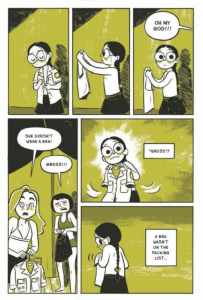
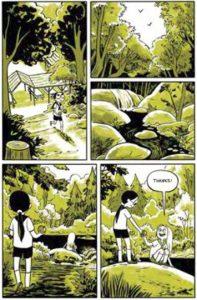
Presentation of information including accuracy, clarity, and organization: Woodson transitions clearly between each child's voice, allowing readers to follow each individual thread. She then twines these strands together in a satisfying message of appreciating our differences and the differences of others. Brosgol makes it clear in her Author's note that she made adjustments and revisions to her actual memories of camp life to create a more satisfying narrative, but the feel of camp life rings true all the same. Time is realistically flexible, Vera's worst times at camp seem to stretch out agonizingly, while her final happy week flies by in just a few pages.
Development of a plot: The plot of "Be Prepared" shines, as it finds that narrative sweet spot between relatable troubles and meaningful resolution. Vera's earnest struggle to make friends in all the wrong ways, and her grudging eventual enjoyment of camp will keep readers turning the pages to find out how she survives it all. The build up to her triumphant night as flag seeker, is all the sweeter after her friendship mistakes. "The Day You Begin" has looser feel, there are plot-like elements to this piece of prose poetry. Woodson addresses the anxieties and fears each child has, leading to the moment of bravery it takes to share their differences and the moments after when the children start to see the value in their diversity.
Delineation of characters: Brosgol's main characters are well-defined individuals, with Vera understandably being the most complexly drawn. The Sashas, Vera's older mean girl tentmates, are both named Sasha, but easily identified from the other with one being more of the leader and more interested in boys. Secondary characters tend a bit toward stereotypes, likely a product of Brosgol's necessary merging of real people. Woodson does a wonderful job with her spare text making each child's voice distinct, from Angelina who watched her sister all summer to the unnamed boy who is physically unable to play the same games as the other children. The illustrations aid in identifying each child, but are not necessary to know a different child is being addressed.
Delineation of a setting: The camp setting of "Be Prepared" is excellently portrayed both in the text and in the illustrations. The particular Russian touches to the camp add a unique twist to a setting that most readers would be familiar with. The "Hollywood" pit toilet must have made quite an impression on young Vera, as its unsanitary horrors are described in detail. Woodson is not very concerned with the setting, opting for a more generalized city and school setting, which does serve to make her words more instantly relatable to more kids.
Appropriateness of style: Brosgol's choice to tell her story as a graphic memoir is aimed directly at reaching her audience of middle grade readers, who love graphic narrative stories. Writing from a first person point of view is the best choice to give readers the necessary insights into her thoughts and feelings at the time. Woodson is well-known for her poetry and with good reason, as her lyrical word choice adds so much to this piece. I love the connection she makes between the curl of hair to the way words curl from a mouth. The second person point of view gives an immediacy and intimacy to her words, addressing both the children in the book and the readers at the same time.
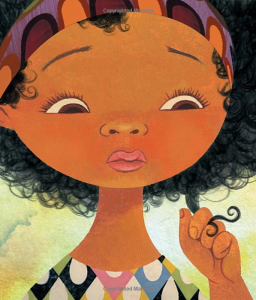
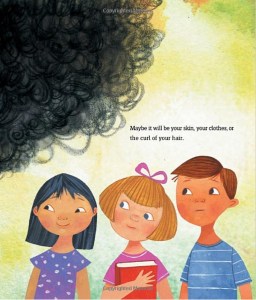
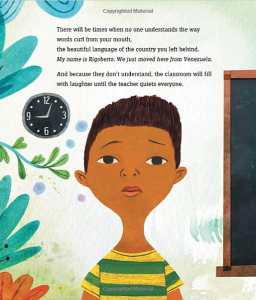
Can we separate the text from the illustrations of these illustrated titles? If so are they worthy of Newbery Award glory? I think so, if you do too, vote for your favorites here!

